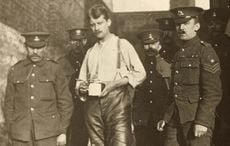Peadar Kearney, the man who wrote The Soldier’s Song, which was translated into Irish and became the Irish national anthem, had to sue the State for royalties in the 1920s because his application for a military pension had failed and he was living in poverty.
Kearney, a veteran of the 1916 Easter Rising, had written the song, with arrangements by Patrick Heeney, for nationalistic-minded young men because he was not happy with the music hall fare they would sing when on route marches, says Prof Colbert Kearney of UCC. Prof Kearney is Peadar Kearney's grandson.
The Irish Times reports that Kearney was sent by Tom Clarke to oversee the Howth gun-running in July 1914. During the the 1916 Easter Rising Kearney fought at Jacob’s Mills under Thomas McDonagh, but his 1924 application for a military pension was rejected. Consequently, he found himself in dire circumstances.
“In October 1926, almost two years after his application, Peadar was awarded a pension of £30 a year, backdated to October 1, 1924. This – less than €2,000 today – would have been a very useful supplement to an income, but as a painter in poor health he was lucky to work half the year.”
Although the Free State government had decided not to nominate a national anthem, in the mid-1920s, "The Soldier’s Song" was adopted by the army for use on special occasions and President of the Executive WT Cosgrave was against replacing it.
“Despite this and despite 'A Soldier’s Song' being played from 1926 onwards at the end of programs on national radio and from 1931 onwards at the end of cinema programs, Peadar received no royalties,” said Prof Kearney, emeritus professor of English Literature at UCC.
“He was forced, together with Michael Heeney – whose late brother Patrick had composed the music – to sue the government and it was de Valera’s 1932 Fianna Fáil government that gave the song statutory status in 1932 and bought the copyright, paying each of them £490.”
Kearney died in 1942 at the age of 58.
In 2006, a handwritten draft of his song sold for €760,000. How would Kearney have reacted if he knew?
His grandson says: “Given he had to sue the state for royalties, I’d say he would have looked on it with a wry irony – he might even have penned a verse about it!"




Comments